Items
Search full-text
Creative Writing
-
"Office for the Arts (2013) Creative Australia: National Cultural Policy. https://www.arts.gov.au/publications/creative-australia-national-cultural-policy-2013" Reads, in part, "Creative Australia (2013) celebrates Australia’s strong, diverse and inclusive culture. It describes the essential role arts and culture play in the life of every Australian and how creativity is central to Australia’s economic and social success: a creative nation is a productive nation."
-
"Bree Hadley (2014) Practice as method: The ex/centric fixations project. In Bolt, B & Barrett, E (Eds.) Material inventions: applying creative arts research. I.B. Tauris Publisher, United Kingdom, pp. 145-165.” "In this chapter, I consider the efficacy of creative practice as a research method, concentrating specifically on its applications in the performing arts, using one of my own recent projects, The Ex/centric Fixations Project (2009), as an example."
- Accessible Arts
-
“Writeability (VIC) is established in 2012” The Writeability program was established in 2012, beginning as a partnership between Writers Victoria and Arts Access Victoria. "Writeability program supports writers with disability wanting to develop their skills and writing careers." It aims to remove barriers and provide information, resources, and fellowships so disabled writers can “tell their own stories in their own way”.
-
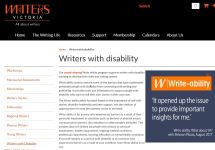 "Writeability website, captured 2018" Webpage reads, in part "Write-ability aims to remove some of the barriers that have traditionally prevented people with disability from connecting with writing and publishing. It provides tools and information to support people with disability who want to tell their own stories in their own way. The Write-ability ethos has been based on the importance of self-told stories, disability-leadership and peer support, and the creation of opportunities for even the quietest voices to be heard."
"Writeability website, captured 2018" Webpage reads, in part "Write-ability aims to remove some of the barriers that have traditionally prevented people with disability from connecting with writing and publishing. It provides tools and information to support people with disability who want to tell their own stories in their own way. The Write-ability ethos has been based on the importance of self-told stories, disability-leadership and peer support, and the creation of opportunities for even the quietest voices to be heard." -
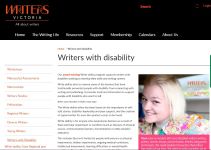 "Writeability website, captured 2019" Webpage reads, in part "Write-ability aims to remove some of the barriers that have traditionally prevented people with disability from connecting with writing and publishing. It provides tools and information to support people with disability who want to tell their own stories in their own way. The Write-ability ethos has been based on the importance of self-told stories, disability-leadership and peer support, and the creation of opportunities for even the quietest voices to be heard."
"Writeability website, captured 2019" Webpage reads, in part "Write-ability aims to remove some of the barriers that have traditionally prevented people with disability from connecting with writing and publishing. It provides tools and information to support people with disability who want to tell their own stories in their own way. The Write-ability ethos has been based on the importance of self-told stories, disability-leadership and peer support, and the creation of opportunities for even the quietest voices to be heard." -
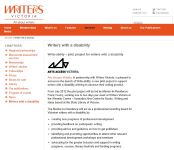 "Writeability website, captured 2013" Webpage reads, in part "Arts Access Victoria, in partnership with Writers Victoria, is pleased to announce the launch of Write-ability, a new pilot project to support writers with a disability wishing to advance their writing practice"
"Writeability website, captured 2013" Webpage reads, in part "Arts Access Victoria, in partnership with Writers Victoria, is pleased to announce the launch of Write-ability, a new pilot project to support writers with a disability wishing to advance their writing practice" -
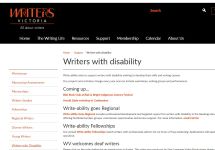 "Writeability website, captured 2016" Webpage reads, in part “Before the advent of Write-ability, writing programs for people with disability in Victoria were few and far between. Examples of successful Australia writers with disability are rare (and deaf writers even more so). Consequently, the number of authentic voices recording the stories of the lived experience of disability has been limited.” Webpage contains information about Write-ability Mentor-in-Residence; Write-ability Fellowships; Write-ability recent projects such as a series 2014 postcards/memes profiling writers, and support, professional development, and writers groups.
"Writeability website, captured 2016" Webpage reads, in part “Before the advent of Write-ability, writing programs for people with disability in Victoria were few and far between. Examples of successful Australia writers with disability are rare (and deaf writers even more so). Consequently, the number of authentic voices recording the stories of the lived experience of disability has been limited.” Webpage contains information about Write-ability Mentor-in-Residence; Write-ability Fellowships; Write-ability recent projects such as a series 2014 postcards/memes profiling writers, and support, professional development, and writers groups. -
 "Incite Arts - stArts with D Performance Ensemble 'Selfies' Residency" Case Study of 'Starts with a D' Performance Ensemble and the 'Selfies' project, reads, in part "Through a combination of group-writing exercises, poetry worksheets, collage and recording of spoken responses, participants created 77 poems under the title: ‘SELFIES'"
"Incite Arts - stArts with D Performance Ensemble 'Selfies' Residency" Case Study of 'Starts with a D' Performance Ensemble and the 'Selfies' project, reads, in part "Through a combination of group-writing exercises, poetry worksheets, collage and recording of spoken responses, participants created 77 poems under the title: ‘SELFIES'" -
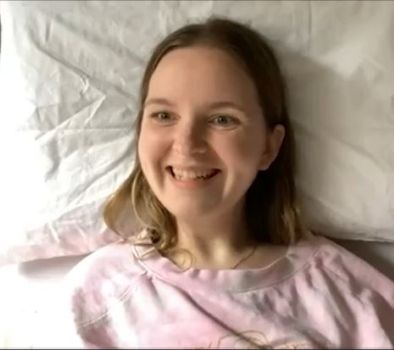 "Interview with Jess Cochran" Jess Cochran (they/them) is an actor, model, writer and disability advocate. Interview Summary: Jess Cochran is a queer, non-binary, neurodivergent, performing artist, advocate, writer, and consumer consultant with a background in both physical and psychosocial disabilities. Their journey into the performing arts began accidentally with a role in the Awards winning Melbourne Fringe Festival production, Qualia, which opened doors to more local and international Awards-winning work in film and stage. Jess identifies proudly with their disabilities and considers their art both a personal expression and a political act aimed at highlighting the issues faced by the disability community. Jess’s work spans across writing, modelling, and various performance arts, and they wish to see an increase of disability arts representation in mainstream media with authentic casting, opportunities and improved accessibility for disabled performers. Jess is also passionate about highlighting intersectionality in disability arts.
"Interview with Jess Cochran" Jess Cochran (they/them) is an actor, model, writer and disability advocate. Interview Summary: Jess Cochran is a queer, non-binary, neurodivergent, performing artist, advocate, writer, and consumer consultant with a background in both physical and psychosocial disabilities. Their journey into the performing arts began accidentally with a role in the Awards winning Melbourne Fringe Festival production, Qualia, which opened doors to more local and international Awards-winning work in film and stage. Jess identifies proudly with their disabilities and considers their art both a personal expression and a political act aimed at highlighting the issues faced by the disability community. Jess’s work spans across writing, modelling, and various performance arts, and they wish to see an increase of disability arts representation in mainstream media with authentic casting, opportunities and improved accessibility for disabled performers. Jess is also passionate about highlighting intersectionality in disability arts. -
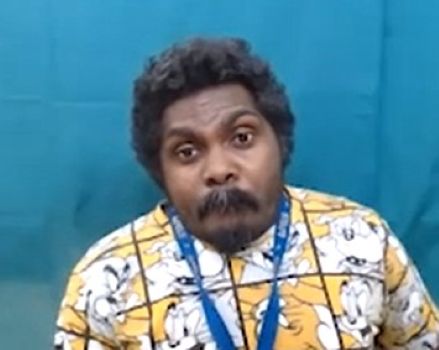 "Interview with Graham Wilfred Junior" Graham Wilfred Junior is a Yolngu man and artist with Incite Arts where he works with different mediums including filmmaking, writing, performing and music. Interview Summary Graham, an emerging artist with spina bifida whose father inspired his passion for art, has pursued various art forms including painting, music, and digital art, now calls Mparntwe/Alice Springs home, and is venturing into theatre and filmmaking. His digital artwork, through the creation of the indigemoji app, helps teach the Arrernte, the language of the First Nations people of Mparntwe/Alice Springs. He now seeks to expand his impact through acting and creating films. Graham's motivation is to both celebrate and inspire people with disability, aiming for recognition as an artist rather than focusing solely on his disability. Graham shares his journey with Incite Arts, highlighting his involvement in music workshops, acting classes and script development, emphasizing the importance of representation and empowerment for individuals with disability. Ultimately, he aims to document his experiences and create impactful performances that leave a legacy to encourage others to pick up where he leaves off, ensuring the continuity of artistic expression within his community.
"Interview with Graham Wilfred Junior" Graham Wilfred Junior is a Yolngu man and artist with Incite Arts where he works with different mediums including filmmaking, writing, performing and music. Interview Summary Graham, an emerging artist with spina bifida whose father inspired his passion for art, has pursued various art forms including painting, music, and digital art, now calls Mparntwe/Alice Springs home, and is venturing into theatre and filmmaking. His digital artwork, through the creation of the indigemoji app, helps teach the Arrernte, the language of the First Nations people of Mparntwe/Alice Springs. He now seeks to expand his impact through acting and creating films. Graham's motivation is to both celebrate and inspire people with disability, aiming for recognition as an artist rather than focusing solely on his disability. Graham shares his journey with Incite Arts, highlighting his involvement in music workshops, acting classes and script development, emphasizing the importance of representation and empowerment for individuals with disability. Ultimately, he aims to document his experiences and create impactful performances that leave a legacy to encourage others to pick up where he leaves off, ensuring the continuity of artistic expression within his community. -
“The Australian Government’s Creative Nation policy released in 1994” ‘Creative Nation’ was released in 1994. This was the first ever cultural policy formally developed by an Australian Government. Alongside a number of art forms, the policy included establishments like libraries in its definition of culture and pledged $250 million in funding to cultural organisations.
-
"David Throsby, Katya Petetskaya (2024) Artists as Workers: An Economic Study of Professional Artists in Australia, Creative Australia, 2024." "Artists as Workers: An Economic Study of Professional Artists in Australia, by David Throsby and Katya Petetskaya, is the seventh in a landmark study, carried out independently over the last four decades by Professor Throsby and colleagues at Macquarie University, with support from Creative Australia (previously the Australia Council for the Arts). Conducted at roughly six–year intervals, the series tracks the working conditions of artists, providing information about their artistic practice, income, career development and pathways, and their broader working lives. The latest survey was in the field late 2022 and early 2023 and examines activity in the 2021-22 financial year. This edition therefore captures the conditions for artists in the wake of COVID-19 and coincides with the Australian Government’s January 2023 announcement of its five-year national cultural policy Revive: A place for every story, a story for every place."
-
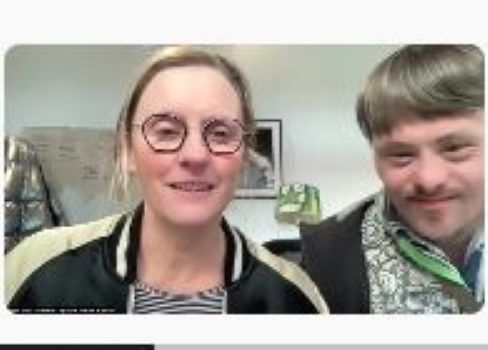 "Interview with Luke Cambpell and Kelly Drummond Cawthon" Luke Campbell is a theatre performer, writer and director and has been with Second Echo since 2015. Interview Summary In the interview Luke Campbell and Kelly Drummond Cawthon from Second Echo Ensemble share insights into their creative processes and the significance of their work. Luke, a core artist for the ensemble, emphasizes the role of deep listening and communication in his art, comparing his work to a meditative exploration of sound and connection, akin to the themes in the movie "Avatar." Kelly, as the ensemble's creative director, highlights the importance of presenting their work across diverse platforms to reach broader audiences and foster inclusive discussions. Throughout the conversation, they express views on the challenges and perceptions surrounding disability arts, advocating for recognition of diverse voices and stories in the arts community.
"Interview with Luke Cambpell and Kelly Drummond Cawthon" Luke Campbell is a theatre performer, writer and director and has been with Second Echo since 2015. Interview Summary In the interview Luke Campbell and Kelly Drummond Cawthon from Second Echo Ensemble share insights into their creative processes and the significance of their work. Luke, a core artist for the ensemble, emphasizes the role of deep listening and communication in his art, comparing his work to a meditative exploration of sound and connection, akin to the themes in the movie "Avatar." Kelly, as the ensemble's creative director, highlights the importance of presenting their work across diverse platforms to reach broader audiences and foster inclusive discussions. Throughout the conversation, they express views on the challenges and perceptions surrounding disability arts, advocating for recognition of diverse voices and stories in the arts community. - Amanda Cachia
-
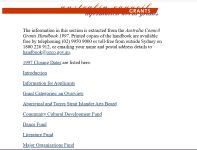 “Australia Council - Grants, captured 1997” Australia Council (Creative Australia) grants captured December 1997. Website reads “extracted from the Australia Council Grants Handbook 1997” and includes Grant Categories: an Overview, Aboriginal and Torres Strait Islander Arts Board, Community Cultural Development Fund, Dance Fund, Literature Fund, Major Organisations Fund, Music Fund, New Media Arts Fund, Theatre Fund, Visual Arts/Craft Fund, Awards
“Australia Council - Grants, captured 1997” Australia Council (Creative Australia) grants captured December 1997. Website reads “extracted from the Australia Council Grants Handbook 1997” and includes Grant Categories: an Overview, Aboriginal and Torres Strait Islander Arts Board, Community Cultural Development Fund, Dance Fund, Literature Fund, Major Organisations Fund, Music Fund, New Media Arts Fund, Theatre Fund, Visual Arts/Craft Fund, Awards -
"Bree Hadley (2022) Disability and the Arts, Creative, and Cultural Industries in Australia. Australian Academy of Humanities" Reads, in part "There are five interrelated factors that support arts workers, arts organisations, and the arts sector at large to develop improved policy, protocol, and training practices."
-
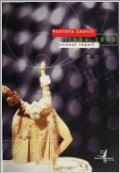 "Australia Council - Annual Report 1994-95" Australia Council Annual Report 1994-95- discusses functions, organisation chart, year in review, work to overcome inequities experienced by artists with disabilities with a review of arts and disabilities developing into an action plan by 1997, artform development, main activities of Council and its Boards, and includes financial statements and lists of grants made including grants for programs, projects, creative development of organisations and an international cultural exchange program.
"Australia Council - Annual Report 1994-95" Australia Council Annual Report 1994-95- discusses functions, organisation chart, year in review, work to overcome inequities experienced by artists with disabilities with a review of arts and disabilities developing into an action plan by 1997, artform development, main activities of Council and its Boards, and includes financial statements and lists of grants made including grants for programs, projects, creative development of organisations and an international cultural exchange program. -
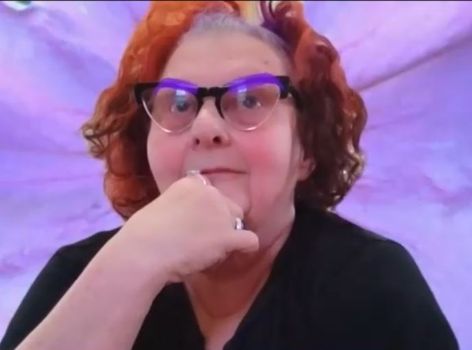 "Interview with Kath Duncan" Kath Duncan is a writer, a director, a provocateur, a visual artist, a comedian, a producer, a journalist, a radio broadcaster and disability advocate. Interview Summary Kath Duncan is an experienced and prominent figure in the disability arts community with a passion for experimental performance arts, having witnessed the beginnings of the disability arts movement in Australia and participated in its evolution. Her art is inherently political, shaped by her unique perspective as a congenital amputee. Kath firmly believes in the inherent creative revolutions and endless inspiration within all impairments. Kath highlights the ongoing struggles within the disability arts sector, including high unemployment rates for disabled individuals, systemic barriers, and the need for disabled leadership in arts organizations. While cherishing the milestones and transformative experiences she's had, Kath calls for significant systemic changes, emphasizing the importance of team playing and collective work to support and grow the disabled artist community.
"Interview with Kath Duncan" Kath Duncan is a writer, a director, a provocateur, a visual artist, a comedian, a producer, a journalist, a radio broadcaster and disability advocate. Interview Summary Kath Duncan is an experienced and prominent figure in the disability arts community with a passion for experimental performance arts, having witnessed the beginnings of the disability arts movement in Australia and participated in its evolution. Her art is inherently political, shaped by her unique perspective as a congenital amputee. Kath firmly believes in the inherent creative revolutions and endless inspiration within all impairments. Kath highlights the ongoing struggles within the disability arts sector, including high unemployment rates for disabled individuals, systemic barriers, and the need for disabled leadership in arts organizations. While cherishing the milestones and transformative experiences she's had, Kath calls for significant systemic changes, emphasizing the importance of team playing and collective work to support and grow the disabled artist community. - The Other Film Festival
- Naomi Chainey
- Jax Jacki Brown
- Alistair Baldwin
- Adolfo Aranjues
-
“Research project ‘Disability and the Performing Arts in Australia: The Last Avant Garde’ investigates the creative and aesthetic strategies of the Australian disability arts sector” A research project beginning in 2016, ‘Disability and the Performing Arts in Australia: The Last Avant Garde,’ investigated the creative and aesthetic strategies of the Australian disability arts sector. The project sought to map “disability arts practice across the nation” by examining “the role of artistic experimentation,” “co-design[ing] accessible strategies,” and raising “critical recognition, employment and funding opportunities for artists.” The project team describes themselves as a collective “of deaf and disabled and non-disabled researcher artists, performers, writers, arts managers and theatre makers.” The work was the result of a collaboration between Arts Access Victoria, University of Melbourne, and University of Sydney. The Australia Research Council provided funding for the research.
